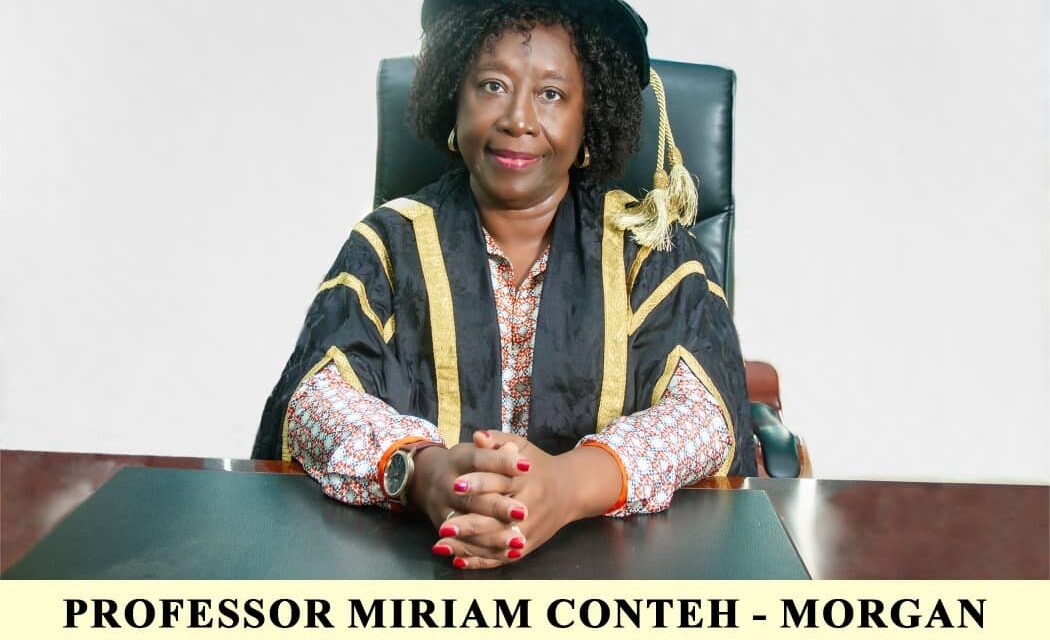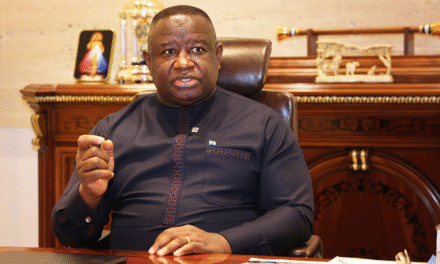By Emmanuel Mbowa
Freetown, 25th August 2025 -As her tenure as Deputy Vice Chancellor (DVC) of the Institute of Public Administration and Management (IPAM) draws to a close, Prof. Miriam Conteh-Morgan leaves behind an indelible legacy in entrepreneurship and innovation. Over the past three years, she has worked tirelessly to prepare students intellectually, socially, morally, and culturally, transforming them into skillful and productive leaders in business, entrepreneurship, public policy, and financial services.
“I want to see students engaged,” she says. “Not just come to class and leave.”
Founded in 1980, IPAM currently hosts around 22,000 students across postgraduate, undergraduate, and diploma programs, a number that continues to grow annually. In 2018, then-Minister of Technical and Higher Education, Aiah Gbakima, projected enrollment would reach 35,000 within a decade. Today, IPAM boasts the highest student population across four faculties.
Previously, the institution spent Le700 million (old notes) annually on rent, prompting the construction of the $5.5 million, seven-story Professor Ekundayo Thompson multipurpose building at Tower Hill. The fourth floor now serves as the secretariat.
Two years ago, only 3,200 of 13,000 applicants were admitted. The limited intake of students, Prof. Conteh-Morgan says, was part of their strategies to address accommodation constraints. “We introduced departmental entry requirements in addition to the university’s ones (5 credits, including English and Maths), and this has helped us admit students who meet these criteria,” she explains.
While the proposed 64-acre Bureh campus remains unrealised, challenges in teaching and learning persist. The administration reduced class sizes from 500 to 300 per hall and introduced The Learning and Teaching Support Unit which assists in making the classroom experience for students and lecturers better; the administration is also equipping two lecture halls with large screens for projection projector screens,” she adds.
“When you have a class of 400, people are busy doing their own thing,” she says. “We give students a place where they can learn entrepreneurial skills.” (note: this quote refers to the Centre of Excellence in Entrepreneurship and Innovation)
Under Prof. Conteh-Morgan’s leadership the first female DVC in IPAM’s 45-year history, the college has seen a dramatic reduction in examination malpractice. Digital cameras (same as CCTV?) were installed in exam halls, and invigilators were given clear mandates.
“We conduct our exams in one of the most credible ways, better than any other institution,” she asserts.
“Students now know they can’t get away with a lot because we have cameras virtually everywhere. We used to have 500 or so cases per semester. Two weeks ago, I signed the discipline committee’s report for first-semester exams, only 22 cases. That speaks volumes.”
Prof. Conteh-Morgan credits her success to collaborative leadership.
“What I’ve done in these three years is get the management team and staff to buy into the vision. I also included students through focus groups to get their views and bring everyone on board.”
During IPAM’s 44th Foundation Day last year, she launched the Centre of Excellence in Entrepreneurship and Innovation, a flagship initiative aimed at bridging the gap between theory and practice.
“I tell people, if you remember me by nothing else, think of the Centre of Excellence,” she says.
The idea was born after she discovered students selling goods in classrooms.
“You’re a business school. Do you practice business?” she asks. “You can’t teach entrepreneurship in the abstract. So, we gave students a space to learn how to be entrepreneursdisplay and market their products. Learning became more practical and we haven’t stopped since.”
She considers the Centre her greatest achievement at IPAM.
“We’ve tapped into the national and global pulse to equip young people with skills to create jobs and brands. I never imagined how it would attract international partners.”
The Centre has earned IPAM recognition from international institutions such as the London School of Economics and recently concluded an engagement with the University of Staffordshire in the UK. Social media influencer Vickie Remoe has also run digital marketing courses there.
“There’s interest in an academic institution making those kinds of headways. We’re pleased with the outcomes, and more is unfolding,” she says with a laugh. “This is my greatest contribution: helping students think beyond academics and venture into business.”
Managing seven provincial campuses has posed financial and logistical challenges.
“We had to cut costs by rationalising our limited resources,” she reveals. “Lecturers used to travel weekly to teach, which was expensive. Now they go every two weeks, and that’s helped.”
But the biggest challenge, she says, is finance.
“We’re state-owned, but our financing model is restrictive. Constituent colleges lack financial independence. Undergraduate and postgraduate fees don’t come to us; only short course and diploma revenue support our nine-campus college.”
Despite IPAM’s large student body, she notes, the institution remains resourceful.
“Prof. Ekundayo Thompson, for example, built this building from internally generated funds,” she further reveals.
Still, her vision for education goes beyond infrastructure and discipline.
“It’s about meeting universal standards and building Sierra Leone’s human capital, instilling lifelong leadership skills in graduates.”
“IPAM was already a big fish in this small pond,” she says. “Let’s take it international.”
As she prepares to leave office, Prof. Conteh-Morgan urges young professionals, especially female academics, to lead with integrity, courage, and professionalism.
“There are only five female professors in the country. One has retired, I will soon retire, and there will be three others, one at COMHAS and two at Fourah Bay College. It would be good to see two women and a man lead the three institutions.”
She concludes with a prayer:
“My fervent hope is that IPAM continues to grow. I’ve recounted what I’ve done, but none of it happened in a vacuum. There were bold and transformative leaders before me, and I pray you those coming after me do more than I have done.”









